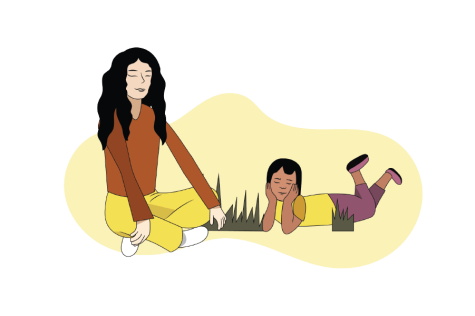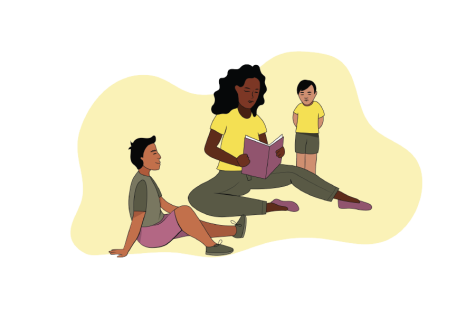Before becoming an au pair, learn from those with experience
July 11, 2022

Editor’s note: This article is from the Communication Department’s award-winning Echo magazine.
Belen Ortiz’s journey as an au pair began when she traveled from her home of Buenos Aires, Argentina, to the U.S. With few job opportunities at home, Ortiz was unemployed and needed to find a way to make money to help support her family. So, she decided to follow her sister’s path of becoming a nanny abroad.
People join the au pair program for many reasons, such as going to school, earning money and learning about a new culture.
“I never loved the idea of being an au pair. My sister once was an au pair and had a terrible experience, but I thought it was better to do something and earn money than to do nothing,” Ortiz says.
During online interviews with her first family, Ortiz noticed some red flags, as she calls them, because of the way the mom interacted with the kids, but ignored them and stayed positive about the job.
Soon after Ortiz arrived at her host family’s home, she says, the host mom became angry with her over a box that had been left on a counter, and Ortiz decided to spend the weekend in her room, where she felt safer. She called her au pair agency and asked to be rematched with a different family.
However, her situation did not improve. Her new family expected her to do extra work beyond caring for the children, including cooking, cleaning and laundry, which she says she wasn’t paid for.
“Once you become an au pair, you must know all of your rights because you are the only one who is able to defend them,” Ortiz says.
Au pairs come to the United States on a J-1 visa, which is a non-immigrant visa for individuals approved to participate in a work study exchange program. Au pairs can live with their host families for up to two years while attending post-secondary school and working as a nanny for the family.
Au pairs are not supposed to work more than 10 hours a day and 45 hours a week, according to the State Department, which oversees au pair programs. They receive room and board, up to $500 per year for educational costs and at least $195 each week for their work.
Alliance for International Exchange, which represents au pair placement agencies, cites high rates of satisfaction reported by au pairs. However, au pair programs have been criticized for misrepresenting what the experience will be like for au pairs and host families.
Terence Burke, a spokesperson for the au pair agency Cultural Care, says most au pairs have a positive experience with the program, but challenges arise.
When they do, Cultural Care speaks with both the au pair and the host family to hear complaints, and investigate any allegations that have been made, Burke says. They attempt to resolve the issue, but when they cannot, they work to move the au pair.

Carolina Rodrigues, 25, traveled from Brazil to Illinois in 2019, and says although she initially struggled to adapt to being away from her country and family, her experience was ultimately a positive one.
“When I came here, I had no idea what it would be like, but it turned out amazingly. I’m lucky,” she says.
Rodrigues’ host family supported her and showed interest in learning about her culture.
“I feel that we are an amazing match. The relationship we have is both personal and professional. They are so open minded about learning about myself and my country,” she says
Another au pair, who will be called Melissa to protect her identity, did not have such a positive experience. After a lengthy process to get her visa and work permit, she traveled from Mexico to Maryland, where her first host family lived.
“My agency promised me a lot of things. I was promised my private room once I moved in with a family, my own car to move around the city and paid days off,” Melissa says.
Before matching with her first family, Melissa used a Facebook group created and run by au pairs to read reviews of potential host families.
She learned that the family she had been placed with was criticized on the Facebook group for their treatment of past au pairs; however, she opted to work with the family anyway. Over video calls, she says, they didn’t seem like bad people.
Melissa flew to her new home and was well-received by the family. As days passed, however, she realized that her host family changed agreed-upon rules, and before things got worse, she left the au pair program to live with relatives in a different city, which hadn’t been her plan.
“Take your time and get to know the families before making a decision,” Melissa advises prospective au pairs. “Also, get to know the city, do some research about the place you are going to.”
Despite the challenges, Melissa is grateful for the opportunity to travel. She met other au pairs with whom she has created friendships, and expanded her cultural knowledge more than she could have imagined.
Evelyn Pico, 23, came from Bogota, Colombia, to the United States. She worked for families in Colorado and Illinois, had bad experiences with both, and found a temporary, third family.
Pico says language was a barrier. Participating au pairs must be proficient in English, according to State Department rules, but some still use Google Translate in order to better communicate with their host families.
Whenever the lady of the house spoke to Pico, she repeatedly asked if she could understand her, even though Pico continually told her yes.
“It was as if I didn’t exist. She would say bad and rude things about me in front of me,” Pico says. “She insisted that it’d be better if I just went back to Colombia.”
However, Pico says her au pair work helped with her personal growth because it helped her recognize her own worth.
It’s important that future au pairs not commit to a program without first being sure of the decision and being informed, she says.
“Ask as many questions as possible; make video calls with the children. It helps you a lot to realize what the family is like,” Pico says. “If possible, put everything in writing in a contract.”
To avoid confusion between au pairs and families, Ortiz says it’s important to be clear that while it’s possible to have a very good relationship with the family, workers shouldn’t assume that they will always be treated as just another family member.
An au pair’s experience can be rewarding — for both the au pair and their host family. Before accepting a job, potential au pairs should communicate with their potential family in order to have a positive cultural exchange, while living far from home.
You can read the entire 2022 issue of Echo, as well as previous issues, on our website.







